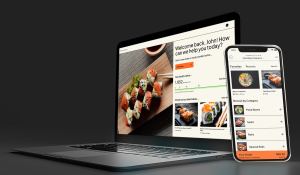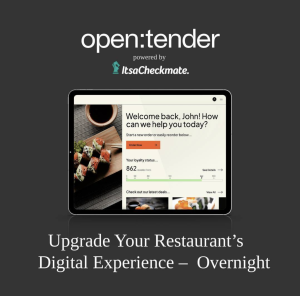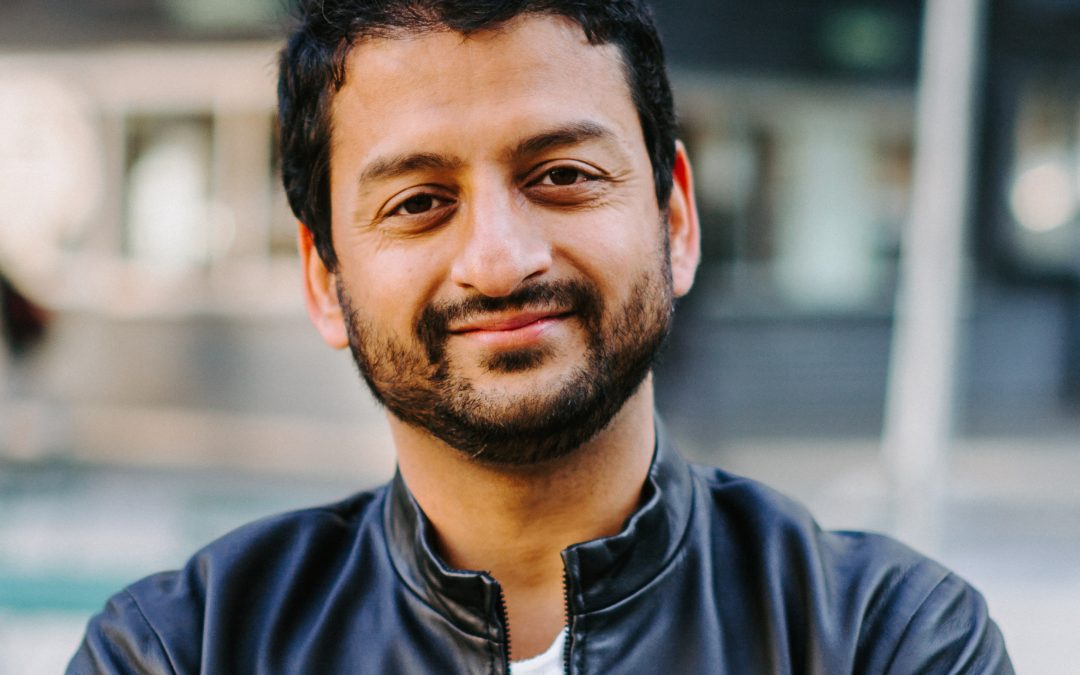Standing on a patch of solid ground between established tech giants and the startups struggling through this strained investor market, ItsaCheckmate founder and CEO Vishal Agarwal wants the industry to see the success stories beyond the layoffs and acquisitions garnering recent headlines.
Agarwal’s isn’t unfurling a “Mission Accomplished” banner for his seven-year-old company’s recent success as much as highlighting a broader theme about restaurant decision makers choosing technologies out of fear that an outside vendor could fail, rather than selecting a brand that’s truly the best fit.

ItsaCheckmate acquired Open Table in March of 2023.
Five months after its acquisition of Open Tender, a Florida-based first-party ordering and guest engagement platform, Checkmate finds itself not as large as tech providers like Toast and Olo, but newly profitable, expanding its product suite and booming during this era of tighter investors and thinner margins.
While rolling out reconciliation and moving into branded apps and websites are significant milestones, rolling out nearly 10,000 locations through deals with Wendy’s and Sonic loom even larger for a company wanting to go toe-to-toe in the enterprise side of the industry.
In total, Checkmate has more than 23,000 locations using its software, with more than 300 million transactions processed for a total of more than $8 billion in orders.
“Let’s talk about the planes that land,” Agarwal of moving beyond the startup phase. “We traditionally have been very inward looking, very subdued in our marketing and our presence, but I think it’s also important for us to say that we are profitable. We have sustained through this period, and have not had any layoffs—2022 was a great year for us.”
Can’t go wrong with IBM
Labeling his company the “most credible alternative to Olo,” Agarwal underscored the importance of adding its own online ordering solution, which was the crown jewel of the Open Tender purchase.
 That addition, he said, is an important component in its goal of competing with the largest, most established tech players in the space.
That addition, he said, is an important component in its goal of competing with the largest, most established tech players in the space.
Adding features is one thing, but Agarwal said broadcasting its cash flow position and profitability to restaurants in the industry is equally important when talking with a CIO of a 300-unit chain that might say “I don’t know if you guys will be around tomorrow” after seeing recent headlines.
In the wake of Nextbite breaking off Ordermark and selling its virtual brands to C3—which Agarwal called one of the most consequential periods in recent years—large-scale operators have expressed hesitations about signing with a company that’s viewed as a startup. He likened it to the old expression that “nobody ever got fired for buying IBM.”
“That’s why it’s so important for us to tell our story that, listen, your job is not in jeopardy if you use us, because we have Inspire [Brands], we have Wendy’s, we have Five Guys who uses us,” he added. “We are profitable and we are the plane that has landed. I promise you, we take off and we land.”
A similar mindset can be found among investors in restaurant technology, Agarwal said, where venture capitalists are jointly pumping the brakes on some investments, but continuing to take active roles in the companies they invest in. “At some point, when we take someone else’s money, we become bound to them,” Agarwal said, noting that it’s a reality he sees as widespread throughout the category.
“The entire industry had a setback, the entire stock market crashed,” he said of recent industry developments. “We are part of that macroeconomic situation that we operate in, so this does not, by any stretch of the imagination, mean that we won’t have innovators in the space and we won’t have people coming in and trying new things.”
Investing in growth
 Zooming out on where delivery goes from this point forward, some restaurant chains are reporting softening off-premises sales. Agarwal remains bullish on delivery, adding that third-party delivery providers proved their relevance to consumers throughout the pandemic, and that relevance persists regardless of short-term fluctuations.
Zooming out on where delivery goes from this point forward, some restaurant chains are reporting softening off-premises sales. Agarwal remains bullish on delivery, adding that third-party delivery providers proved their relevance to consumers throughout the pandemic, and that relevance persists regardless of short-term fluctuations.
“That convenience is there to stay, which is going to make these [delivery] players more relevant, which is going to make their economics, their businesses, more viable,” he said.
With a toddler at home, he pointed to everything from flower deliveries to emergency groceries for increasing the network effects of the largest delivery providers, which he said have collectively become “the most innovative players of anyone else anywhere in the world.”
Getting back to landing planes, Checkmate has a “coffee with Vishal” program where its network of fully remote employees are able to switch on video feeds and have face-to-face conversations with the company’s founder.
That transparency, Agarwal said, is critical to how he’s started and run the company through highs and lows that have all been relatively recent. Above all, building and fostering a company culture has been among his brightest moments, counterbalanced by the hard days in the past, including almost going bankrupt years ago.
“What’s been the most gratifying thing in this entire process? To me, 100 percent, it’s been building the team,” Agarwal said. “The culture we have built around the team, the way they all operate, the commitment that they all show and the integrity with which they all work…has been an absolute high point.”
Saying that further challenges are inevitable, the CEO said entrepreneurs “cannot let yourself or your emotions be dictated by the highs and the lows, because then you’ll be like a rubber band that will snap.”
Outlining where Checkmate goes next in this era of tight money and increasing partnerships, Agarwal said recent months have been like celebrating Diwali in the midst of a house fire—good news while the horizon remains uncertain.
“Our focus right now is let’s integrate Open Tender, let’s create solid operational and repeatable processes around it and, once we have that, then let’s create a path where we can say, hey, if we spent another $5 million on this it would give us a 5X return, because raising money just for the sake of it doesn’t do you anything,” he said. “You have to have a way to deploy it to generate scale.”


